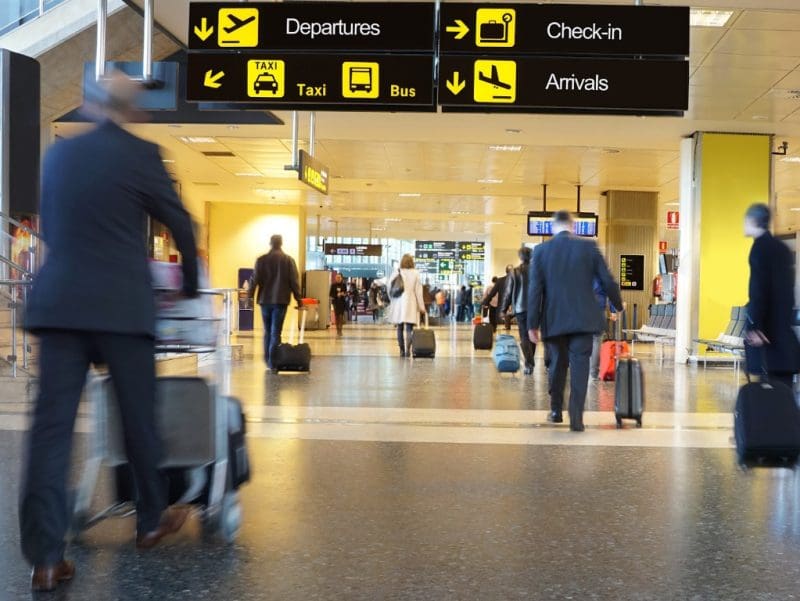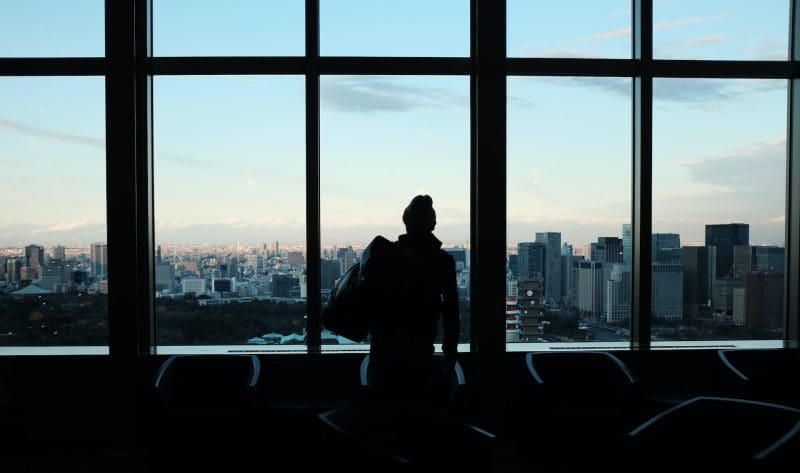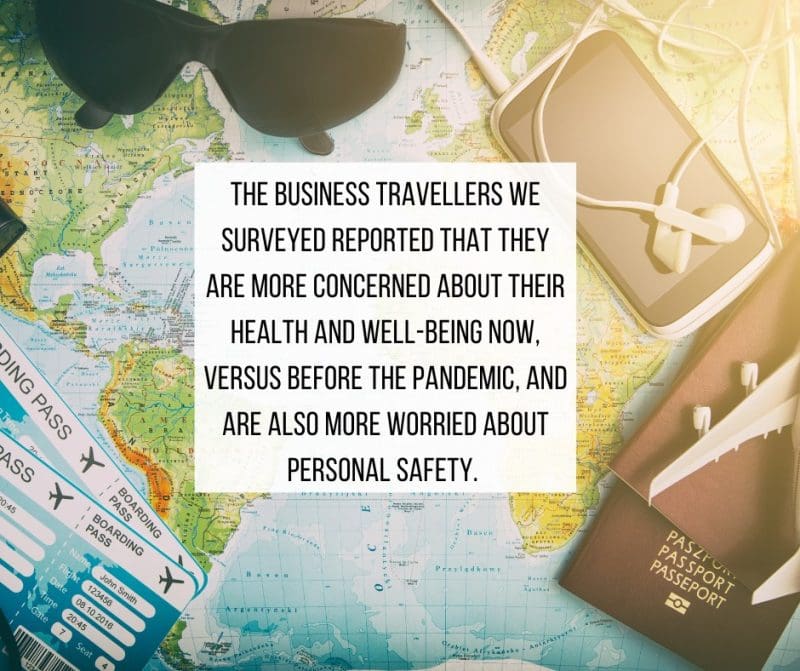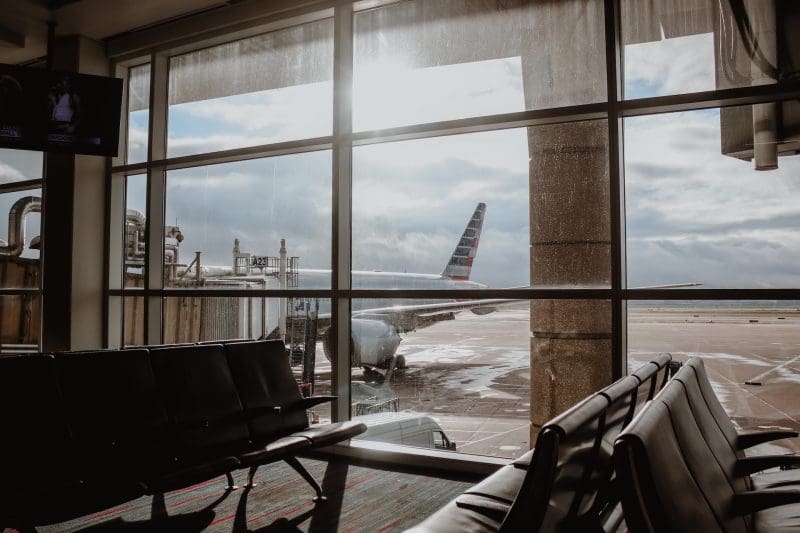Survey says: some business travellers are reluctant to get out there
BOB MOWAT
With over 20 years of global experience in travel risk management, public security and emergency operations, Frank Harrison, Regional Security Director, North America, World Travel Protection (WTP) talked to Travel Courier about a new survey by Opinium that WTP commissioned.
The survey digs deep into the attitudes of business travellers to travelling in today’s world, with Harrison telling TC: “In terms of headlines, we found that the majority of business travellers are not happy to be travelling again, despite the fact that travel in general seems to be rebounding.”

World Travel Protection recently commissioned a survey by Opinium that looked at the concerns, attitudes, and behaviours of business travellers in Canada and the US. There’s certainly a lot in it, but I’m wondering if to start, you could outline the key findings of the survey in brief. What are the headlines, so to speak?
First, a bit of context. At WTP we know that business travel has been upended in recent years, not only by the pandemic, but also by the conflict in Ukraine, civil unrest in many parts of the world, increasing natural disasters and more. As a result, companies have been forced to take a hard look at where they’re sending their employees, for what purpose and at what cost. Importantly, they’ve also had to rethink strategies around how best to keep their travelling employees safe. We wondered: how are business travellers feeling in this new environment? Our survey yielded some thought-provoking results. In terms of headlines, we found that the majority of business travellers are not happy to be travelling again, despite the fact that travel in general seems to be rebounding.
The business travellers we surveyed reported that they are more concerned about their health and well-being now, versus before the pandemic, and are also more worried about personal safety. Importantly, only a small majority of Canadian business travellers (54%) believe that their company would be able to help if they had an emergency.

I think what caught my attention was that the industry – travel management companies, corporate travel specialists – are all talking about the rebound in business travel and the fact that people are back on the road. Is there a bit of a disconnect here? Is the industry missing something that they need to look at when dealing with business travellers going forward? What do they need to do?
Corporate travel specialists should remind their clients about the increased risks of travelling today and share strategies to manage those risks. To effectively educate their travellers, organizations need to have a clear understanding of their travellers’ travel capabilities and resilience, the destinations they will be visiting, and the work activities they will be engaged in. Many organizations work with a specialized TRM provider to ensure their duty of care focuses on their travellers.
To innovate, organizations can provide personalized travel options that consider individual preferences and concerns, such as remote work arrangements or customized travel itineraries. Success in the post-pandemic business travel world requires adaptability, innovation, and prioritizing employee safety. Corporate travel experts can pre-emptively address risks to ensure a secure resumption of travel.

Digging a little deeper, what are some of the specific concerns that business travellers have these days when they are on the road?
Our research found that travellers have a variety of worries ahead of business travel. Top concerns include experiencing delays and disruptions, catching COVID-19, losing their phone or laptop and being the victim or target of a crime.
A majority are also concerned about losing their passport, geopolitical threats, being hacked using an unsecured WiFi network, and being caught in a natural disaster. All of these are very legitimate concerns.
How significant has the pandemic been on increasing (or creating) the concerns of business travellers today? Are the concerns that have been reported in the Opinium survey going to be long-lasting concerns or will they go away as people become more comfortable travelling in the world we live in today?
The pandemic certainly created trepidation around travelling, as well as significant staffing shortages across the sector and ongoing delays and cancellations – a big concern of travellers. And, as the world around us continues to be disrupted by geopolitical threats, political unrest and climate change, we can anticipate that travelling will only become riskier.

Will travellers get used to accepting these risks? That’s tough to say, especially as we know mental health concerns are on the rise among many travellers, and it’s possible some may decide to stay home. But organizations can help in a significant way by providing their travellers with the tools they need to manage these risks – and in turn, support them during their travels.
There have been many important innovations in the area of travel risk technology and more companies should be adopting these tools and strategies. At WTP, for example, we’re delivering robust AI-driven solutions to optimize traveller safety. Our technology allows us to anticipate risks and provide pre-travel intelligence so that travellers know exactly what to expect when they arrive at their destination. We can be in touch with our travellers immediately, wherever they may be, through a secure travel app on their mobile phone.
We can also respond in real time – to locate the traveller, communicate with them, assist, and potentially extract them across borders, time zones and governments.

It’s important to know that travellers may have different risk tolerances depending on their circumstances and travel reasons. Some travellers may become more risk-averse and choose to avoid travel altogether, while others may become desensitized to the risks and continue to travel regardless. Providing travellers with comprehensive risk management tools and support can go a long way in helping them make informed decisions and feel more confident and secure while travelling.
Now the survey covered a lot of ground, so can you talk a bit about what it discovered about mental health – or concerns about health and well-being – and the business traveller?
Significantly, 52% of Canadian business travellers say they are worried about experiencing high anxiety while travelling, and a quarter say they are more concerned about their health and well-being while travelling now, compared to before the pandemic.
Further, many report feeling stressed (30%), exhausted (27%), homesick (28%) and anxious (27%) when travelling for work.
These are significant and troubling findings, underscoring the importance of addressing mental health as a rising concern. It’s well known that loneliness, social isolation and deteriorating mental health have become more pronounced with travellers since the pandemic, and for many, this is compounded by being away from traditional support networks.

Organizations need to be aware of these challenges, and have solutions in place to support their employees, especially those who are travelling.
The last time we talked, you raised the issue of safety or rather concerns about safety for women travellers. What did the survey find in this area? Have women business travellers become more concerned about their safety while they’re on the road?
As we know women face unique challenges when it comes to safety. Our survey revealed that, unsurprisingly, almost 7 in 10 business travellers agree that traveling for work as a woman is less safe than travelling as a man, and almost a third of travellers prefer not to travel to countries where women’s rights aren’t protected.
Looking at the global data from our survey, we found that women travellers are more likely to take measures to protect their safety during business travel than men.
Almost one in three (31%) say they do not travel or go out on their own at night, compared to 18% of men, and almost half (46%) always stay in close touch with family and friends so their whereabouts are known, compared to 36% of men. Unfortunately, over one in ten women business travellers (12%) say they have experienced a negative incident, ranging from minor theft to assault when travelling, and one in ten (10%) have been unwell with a women’s health problem while travelling but felt unable to get help because of the stigma around women’s health issues.

Safety risks for women generally increase in countries with less equality. It’s therefore critical that women have a full understanding of the cultural norms in their destinations, such as what to wear and how to act. At WTP we often undertake specific risk assessments for women business travellers to make sure their safety and security is the highest priority.
Similarly, LGBTQ travellers also face unique risks when travelling, including discrimination, harassment, and even violence in certain parts of the world. LGBTQ+ travellers must understand their destination and local laws and attitudes toward the LGBTQ+ community.
At WTP, we strive to support a diverse and inclusive environment for all travellers and provide resources and support to ensure the safety and well-being of all gender and identity at-risk travellers.
Duty of care is something that TMCs, corporate travel managers, business travel specialists are talking about more and more these days. Yet the survey found that not all travellers are confident that their company would be able to help them in an emergency. It seems to me that this is a critical issue that companies and TMCs need to address and need to address very quickly. Can you talk about this?

Duty of care is the legal responsibility of an organization to avoid any behaviours or omissions that could reasonably be foreseen to cause harm to its employees. It and negligence frame the parameters of travel risk.
The pandemic spotlighted the importance of duty of care and negligence, and illuminated that corporate travel responsibilities must address the foreseeability of risk, and implement measures to reduce and avert those risks.
This means understanding the risks associated with a destination, the activities that the traveller plans to conduct at the destination, and the routes needed to get them home safely if necessary.
Tellingly, our survey revealed that only a small majority of Canadian business travellers feel their organization would be able to help if they had an emergency (54%) or required medical help (50%) while travelling.
This is a concern; organizations must understand that not managing risks for their travellers may expose them to significant incident causation and loss; losses which could include personnel, assets, reputation and liability. Not managing risk is also considered gross negligence.

What about the role of embassies and governments when a traveller has an emergency. Do business travellers understand what their embassy and government can do for them when they have a problem? What do they need to know?
Misconceptions abound regarding the level of assistance that embassies and governments offer.
At WTP we frequently encounter travellers and organizations who believe that simply visiting their home country’s Embassy or High Commission will resolve their problems.
Indeed, our survey revealed that almost three quarters of Canadian business travellers believe their embassy will help them get medical treatment if needed (70%) and a majority think their government would pay to get them home (55%). Unfortunately, this is not always the case.
Even though embassies and governments may offer certain services, such as a list of lawyers, medical practitioners, and hospitals, they typically do not get involved in security-related incidents like an arrest or unjustifiable detainment, medical care, or funding for the return to a home country.

There’s lots of technology out there today to help travellers stay safe, but the Opinium survey indicates that travellers aren’t using the travel assistance apps their companies provide. Can you talk about why this is the case?
The finding that only about 20% of business travellers have bothered to download a travel app recommended by their employers is a bit surprising in the current environment. Today, through a secure travel application on a mobile device, organizations can instantly communicate with their people, no matter where they are, and react in real-time to locate, communicate, aid, and if necessary, evacuate them. So why don’t business travellers take advantage of this ready technology?
Our survey showed that the main reasons are that travellers think they already know what to expect when they get to their destination (25%), and also believe they are travelling to an area they consider “safe” (24%).
Here’s the challenge with this thinking: even previously considered “safe” locations are now vulnerable to unforeseeable natural disasters, political unrest, increased crime rates and other threats. Utilizing a travel assistance app is a reliable solution to ensure travellers’ safety and support them during emergencies. Other less-often offered reasons offered by travellers include concerns around data privacy and worrying it’s a cyber security risk (16%) and not wanting their company to know their whereabouts while travelling on business (14%).

What’s important to know in these cases is that while data privacy and tracking accuracy concerns are valid, reputable risk management companies provide secure travel apps. Moreover, these apps offer settings that give travellers control over their privacy. Business travellers must prioritize their own safety and utilize travel assistance apps to ensure they receive support during unforeseeable events.
What have I missed? Is there something that I should have asked you that I didn’t ask you? If there is, what’s the question I should have asked and what’s the answer?
The pandemic has caused a change in the world, including the way business travel operates. Here’s a question: Have organizations and businesses taken steps to prioritize the traveller by changing travel risk management processes? Unfortunately, most have not. As more employees return to travel, many companies are treating the opportunity like it’s 2019, following a pre-COVID travel risk model – or in some cases, no model at all. Unfortunately, the potential legal and reputational consequences of such an approach are significant.


















